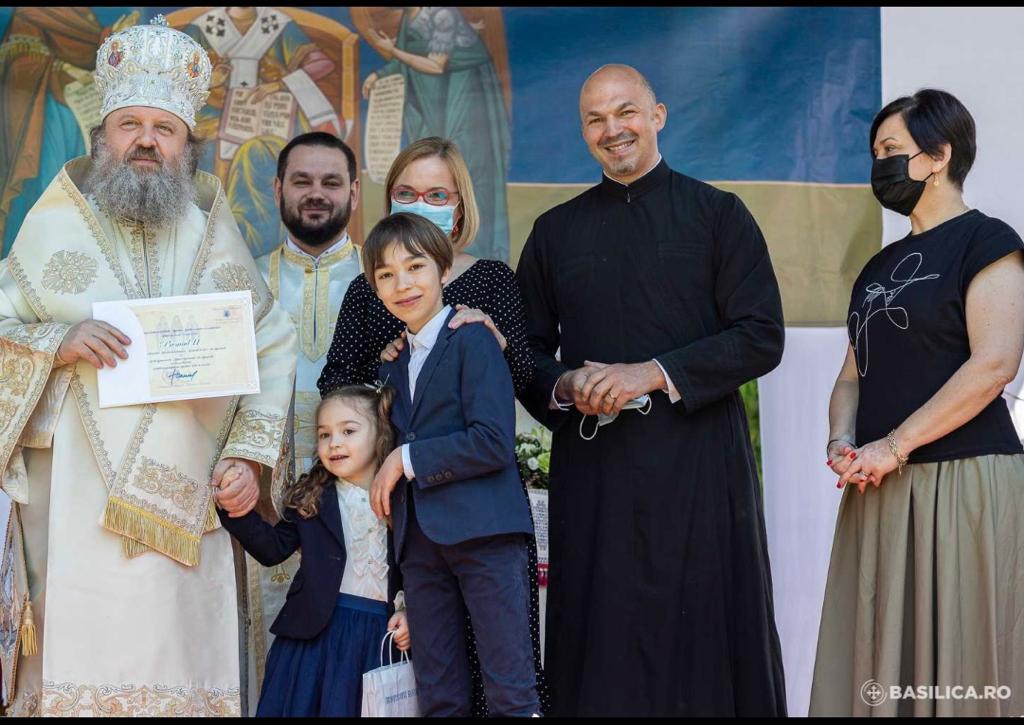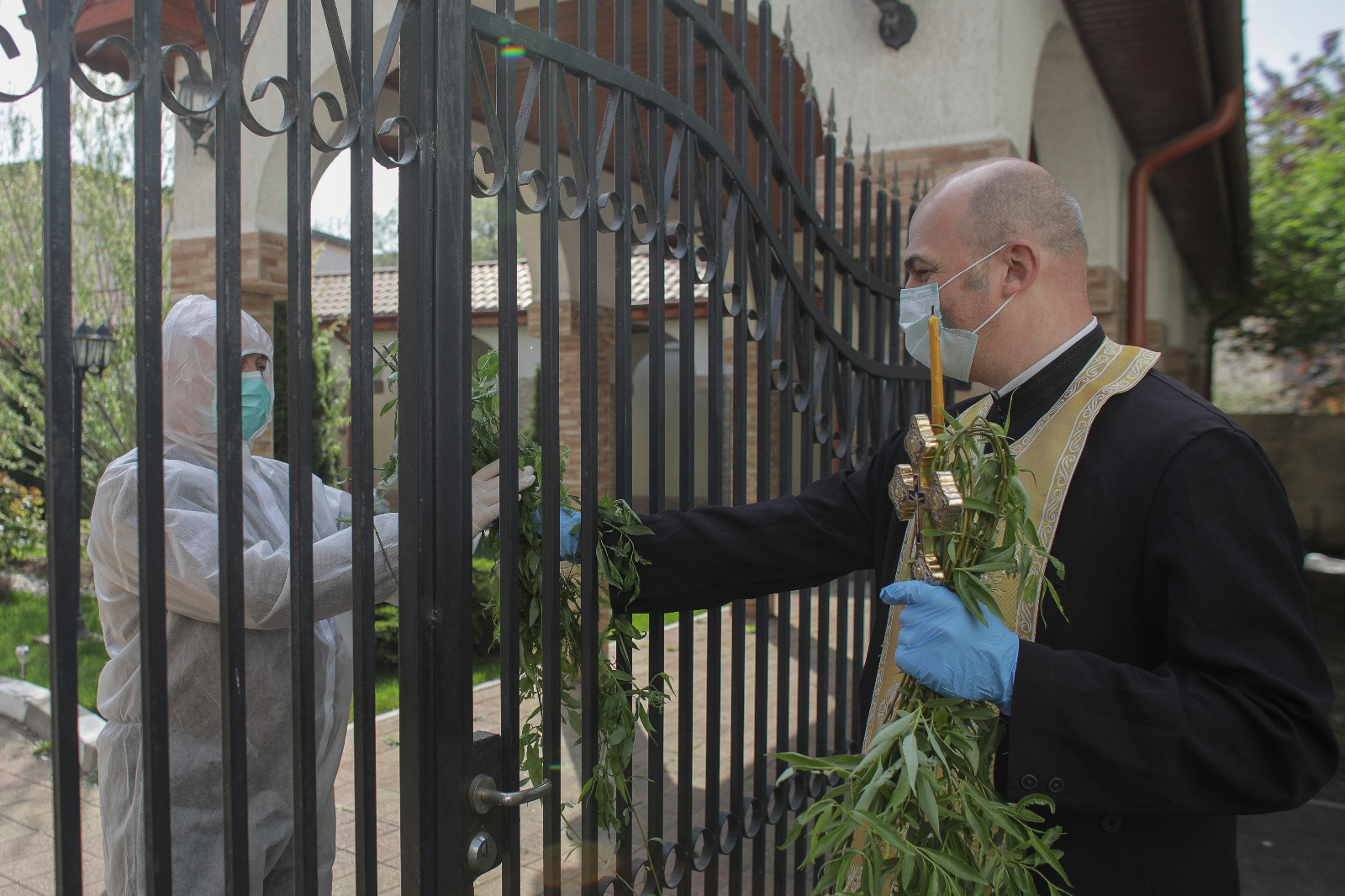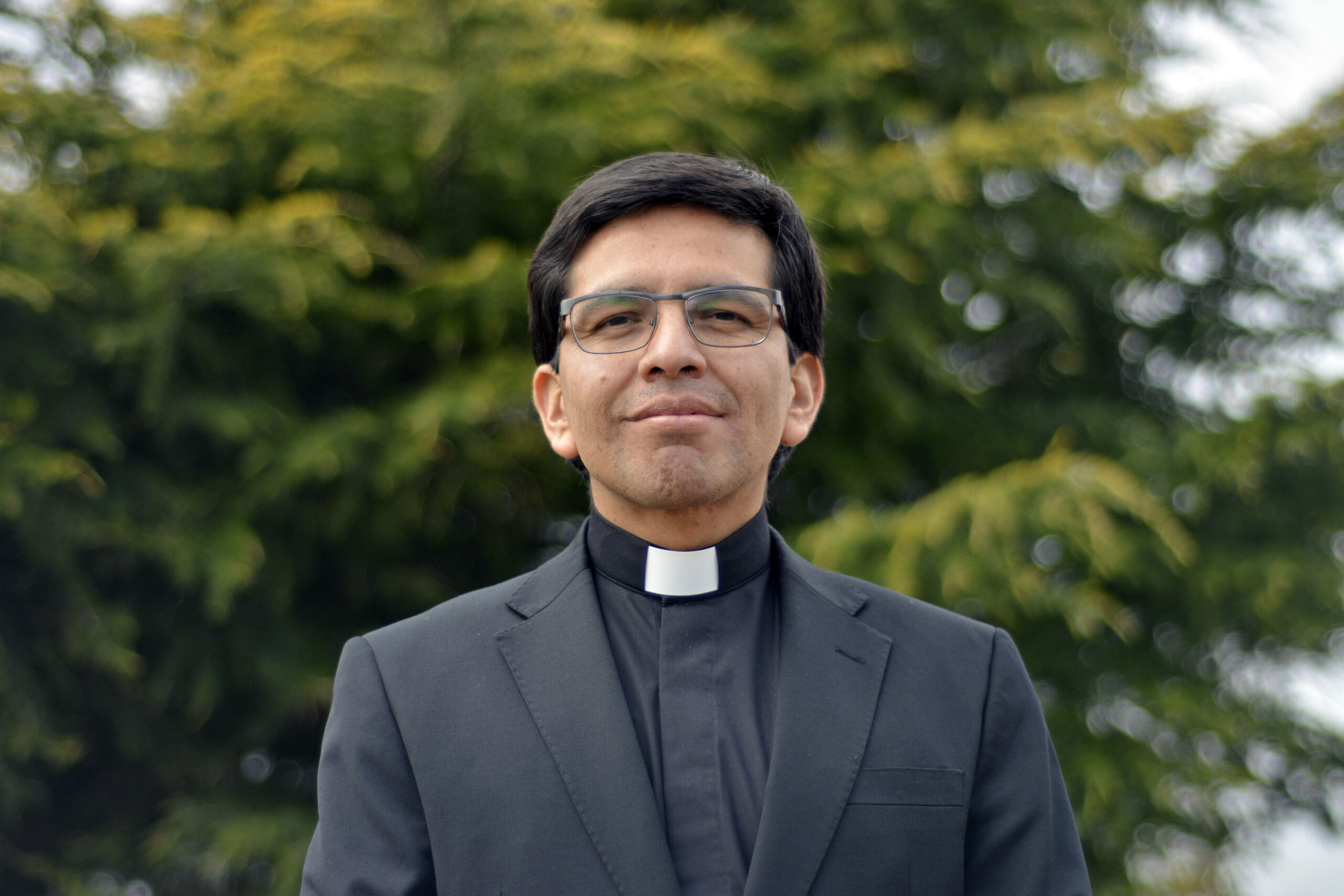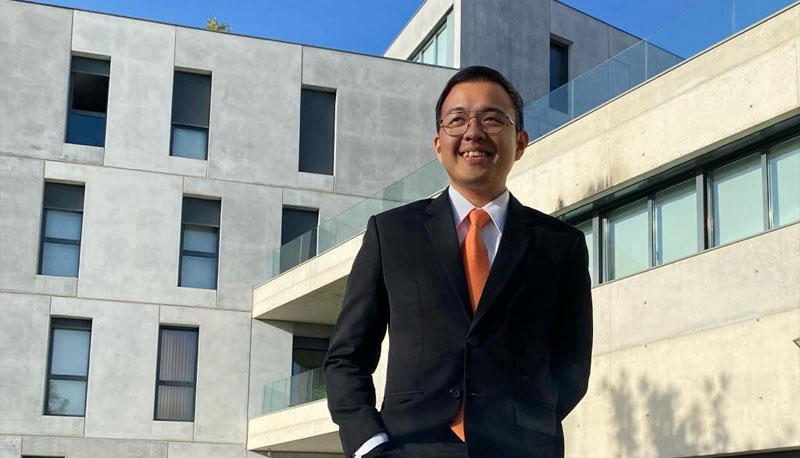
His studies qualified him to work at the Press Office of the Romanian Orthodox Patriarchate. Some of his most beautiful experiences have been covering the visit to Romania of Pope Francis in 2019. "Thanks to the tools acquired in communication studies at Holy Cross I have been able to become a better communicator and spokesman," says Fr. Bogdan.
He also holds a doctorate in theology from his home country, specializing in catechetics and homiletics. "I have focused my communicative activity on the intensification of the dialogue between the Church and cultureThe Church is the creator of authentic cultural values. This is very important in a country like Romania, where we are still facing the problems created by the communist dictatorship that lasted for so many years," he says.
Bogdan Teleanu is well known in his country both for his work of evangelization and pastoral service, especially in this last year of pandemic. He is married and has three children. In the Orthodox Church they can receive priestly ordination after marriage, although they cannot become bishops.
The year 1999 marks a very special period in the history of Romania ten years after the fall of the communist regime.
Indeed, the first trip of a Catholic Pope to our Orthodox-majority country: St. John Paul II. It was on May 9, 1999, a historic date! I still remember - because at that time I was already working in the Press Office of the Orthodox Patriarchate - when, in Podul Izvor Park in Bucharest, at the end of the Eucharistic celebration presided over by the Pope, in the presence of Patriarch Teoctist, Catholics and Orthodox shouted an unexpected cry: "Unitate! Unitate!", which in our language means "Unity, unity". These images have remained in the memory of all Romanians. And it was precisely during the first visit of John Paul II that I was informed about the Faculty of Communication of the Pontifical University of the Holy Cross.
And how was the experience of being an Orthodox priest at a pontifical university in Rome?
I always repeat, speaking of that rich experience, what the Fathers of the Church say: "There is no longer way than the way between the mind and the heart". And for me, in particular, being an Orthodox in a pontifical university was a connection between the mind and the heart. I overcame the difficulties of the language and of traveling to Romania to be with my family. I thank the benefactors because thanks to them I was able to study in Rome. Their contribution is fundamental.
What does it mean, in your opinion, to be a communicator?
Well, for me, being religious, it is above all an act of purification, that is to say to make your feelings coincide with what you communicate. Ignoring your inner problems, not purifying your conscience, means communicating a lie! The mechanism of communicating faith is found in this "process of conscience", which is to look inside ourselves and find something that enlightens us, our reason for being: goodness and holiness materialized in the face of Christ.
We are the "wires" that connect the different institutions and people. If we do not take care of these "wires", that is, if we try to have a sinless moral conscience, it is very difficult to transmit the reality about the Church or the family, professional and personal needs of people. Therefore, first and foremost, there is a need for concordance between thought and expression.

Bogdan Teleanu is well known in his country both for his work of evangelization and pastoral service, especially in this last year of pandemic. He is married and has three children. In the Orthodox Church they can receive priestly ordination after marriage, although they cannot become bishops.
One of the problems in his country is emigration, "because there are so many Romanians abroad. The Orthodox Church in Romania is very committed to supporting the families of those who emigrated, especially taking care of the children who are left alone in the country because their mothers and fathers are forced to go abroad to work to send money home," he says.
These children in Romania are called "white orphans". According to estimates, out of 5 million Romanian children, 750 thousand are more or less violently affected by the departure of their parents. Of these, 350,000 have been deprived of one of their parents, while 126,000 have been deprived of both parents. But there are more than 400,000 children who have experienced, for a period of their lives, a form of loneliness.
Speaking of thought and expression, how did you experience the communist regime as a child?
My effort is to keep that essential memory of everything that happened to me personally. I am convinced that it is fundamental, at the historical level, to keep that "great saving memory" that constitutes the spirituality of the Romanian people.
However, everyone lived in fear, even my parents advised us not to talk about what we heard on the radio, about Europe, about freedom, about prayer, about our faith. But I could not accept this fear, even at school I opposed the communist regime. Once, for example, the history teacher in the gymnasium asked us kids if we went to church. Everyone went, but no one dared to speak up, because we knew what the teacher's real goal was. Well, I felt a rebellion in my heart, and I stood up and told him: "I always go to church! Well, he was surprised and asked me why I believed in God. I replied, "The universe must have an end, and I believe that the end of the universe is in God's hands." His reaction was good, because he told me that I was a very brave boy!
What remains today from that era?
The lack of values, in general... And poverty and inequality. The problems created by an atheistic political regime, as was the communist system, did not represent a novelty for the Christian world, since the vision of the reality of communism has much in common with the heretical vision of dualistic-Manichaean type: in fact, communism also divided the world into two totally independent and opposite spheres, good and evil.
However, Christianity has the capacity to propose a middle way that allows dialogue not only between Christians, but also between Christianity and the secular world. But today, more than is commonly believed, there is a need for a "new evangelizationThe "new culture of the country itself, also to respond to new problems, to new difficulties that are not supposedly caused by the communist dictatorship.
Which ones?
I am reminded of what Pope John Paul II told us: "You who have freed yourselves from the nightmare of the communist dictatorship, do not allow yourselves to be deceived by the false and dangerous dreams of consumerism. They too kill the future. Jesus makes you dream of a new Romania, a land where East and West can meet in brotherhood. This Romania is in your hands. Build it together, with audacity. The Lord entrusts it to you. At that time we did not know what the problems of consumerism and a materialistic society were... Today we do see them.
Emigration is also a problem.
If before we lived in a country almost isolated from the outside world, today we have the sore of immigration and, above all, of emigration, because there are so many Romanians abroad. The Orthodox Church in Romania is very committed to supporting the families of those who have emigrated, especially taking care of the children who are left alone in the country because their mothers and fathers are forced to go abroad to work in order to send money home.
To these children in Romania are called "white orphans". According to estimates, out of 5 million Romanian children, 750,000 are more or less violently affected by the departure of their parents. Of these, 350,000 have been deprived of one of their parents, while 126,000 have been deprived of both parents. But there are more than 400,000 children who have experienced, for a period of their lives, a form of loneliness.
...And I know that you are very involved in this kind of care for the existential peripheries, as our Pope Francis calls them.
Yes, that's right, and especially since last year, when I had to leave my job at the Press Office of the Romanian Orthodox Patriarchate after being appointed parish priest of St. Panteleimon's Church in the center of Bucharest. The former parish priest became ill and died of COVID. And I, being also a father of a family, had to give up some responsibilities to carry out the activities of the parish which, in fact, is a very difficult reality, not so much because of the people, but because of the work that remains to be done, because of the working conditions, the needs of the parishioners.

Fr. Bogdan Teleanu is very involved in pastoral activity in the existential peripheries of his city. Last year, he had to leave his job at the Press Office of the Romanian Orthodox Patriarchate after being appointed pastor of St. Panteleimon Church in the center of Bucharest.
"The former parish priest passed away because of the COVID. And I, being also a father of a family, had to give up some responsibilities to carry out the activities of the parish which, in fact, is a very difficult reality, not so much because of the people, but because of the work that remains to be done, because of the working conditions and the needs of the parishioners," he explains.
His communication studies have helped him to create a web site http://ateneulsfantuluipantelimon.blogspot.com to promote theater performances (of which he is a scriptwriter and author). "In our activities we try to rediscover our artistic, historical, cultural, musical heritage... In addition, we have re-founded an old newspaper, which had been closed during the communist era, and with my wife, who works for Eparchy television, we have made a documentary about how, by chance, we discovered the existence of this newspaper and how we worked to republish it."
Pastoral problems are diverse and complicated. However, I, in particular, have benefited a great deal from the training I received in communication studies, since I created a web site http://ateneulsfantuluipantelimon.blogspot.com to promote a program that I have launched and which I have called Ateneo di San Pantelimon. We put on theater shows (of which I am the scriptwriter and author) for all those who want to participate: people of the parish, children, migrants, etc. In our activities we try to rediscover our artistic, historical, cultural, musical heritage... Moreover, we have re-founded an old newspaper, which had been closed during the communist era, and with my wife, who works for the Eparchy television, we have made a documentary about how, by chance, we discovered the existence of this newspaper and how we worked to republish it.
What is the current situation on the road to unity between Catholics and Orthodox?
Well, progress continues to be made... Already in 2002, Patriarch Theoctist returned the visit of John Paul II in Rome and, on that occasion, the two religious leaders signed a joint Declaration in which they reaffirmed the commitment to "pray and work for full visible unity" among all the disciples of Christ. Our purpose and our ardent desire is full communion, which is not absorption, but communion in truth and love. It is an irreversible path, which has no alternatives: it is the path of the Church.
Another pivotal moment has been the visit of Pope Francis in 2019, who reminded us that in this particular moment, all of us, Romanian Catholics and Orthodox, must be courageous. The world is afflicted by many, dramatic problems. We are all called to work for the unity of the whole human race, for solidarity, for peace, always remembering those wonderful words of John Paul II: "Do not be afraid!". I believe that this message remains today the foundation of unity and of our way for Christians to bear fruits of peace and solidarity in our country and in the whole world.
And in this sense the role of faith communication is very important....
Of course! The media can play an important role, being a means of pressure that can contribute to socio-political, cultural, value, even climatic change in the country and in the world. I always say that we cannot be like Yuri Gagarin: go to heaven and come back without wanting to meet God in this very heaven. On the contrary, we Christian communicators have to continue exploring reality, studying, using every means at our disposal to navigate in our space, our heaven, which is the human mind, necessarily permeated by the saving memory of God, who lives in it, and in which we have to live together.
Thank you very much, Father Bogdan. It is gratifying to know that, through the formation in the Faculty of Communication of the University of the Holy CrossIn this way, the mission of a Church that is not Catholic, but sister in faith and mission, has been helped.
Follow our interviews among former and current students, of the Faculty of Social and Institutional Communication of the Pontifical University of the Holy Cross, on the 25th anniversary of its foundation.
Gerardo Ferrara
BA in History and Political Science, specializing in the Middle East.
Responsible for the student body
University of the Holy Cross in Rome

